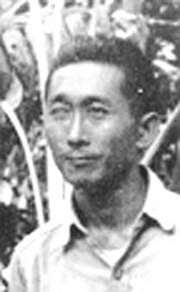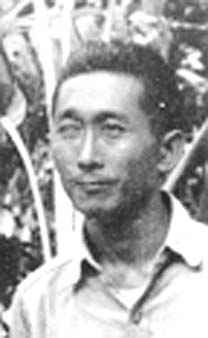
Base de Datos de Experiencias Militares de Japoneses Americanos

Roy Toshitsura Uyehata
Company D, Reception Center, Camp Wolters, TX
Military Intelligence Service Language School (Graduated Savage, June 1942)
HQ, US Army Forces In South Pacific Area (USAFISPA), Noumea, New Caledonia
Commander South Pacific (COMSOPAC) HQ, Noumea, New Caledonia
XIV Corps HQ, Guadalcanal
XIV Corps HQ later 165th Language Detachment, Bouganville and Philippines
(WW II) Eighth Army
302nd MIS Company, Korea
500th MISG, Tokyo, Japan
6227th USAR School
601st Mobilization Designee Unit, Presidio of San Francisco (Reserve)
Interrogator of Prisoners of War
Document Translator
Intelligence Officer
Other Countries: Noumea, New Caledonia; Guadalcanal; Bougainville; Luzon,Philippines; Korea; Tokyo, Japan
Bougainville
Luzon during WW II
South Korea during Korean War
Oak Leaf /Cluster - Received for performance of intelligence duties on Luzon Island
Army Commendation Ribbon with Metal Pendant - Received for my performance of intelligence duties during Korean War.
Lack of warm clothing under frigid weather condition made our lives very miserable in Korea.
In May of 1942, about 25 Nisei soldiers were transferred to the MISLS, Camp Savage, MN. Six of us graduated one month early and were promoted one grade. Two Caucasian graduates were commissioned as 2nd Lieutenants.
On December 23, 1942, we arrived at Noumea, New Caledonia. All of our intelligence duties were performed at COMSOPAC. We Nisei were heavily guarded at all times. We were never permitted to enter any of the adjoining rooms within the same building. A Marine Corp sentry was on duty at the entrance of the workroom and always accompanied us whenever we used the latrine. We worked 7 days a week until more linguists arrived from the US.
On February 13, 1943, we were sent to XIV HQ on Guadalcanal to perform intelligence duties, primarily interrogating Japanese POW's and translating captured documents.
In early December 1943, we were flown to Bougainville to continue interrogation of Japanese POW's.
The XIV Corps wwas able to pin an overwhelming defeat on the famous Japanese 6th Division in March 1944. On March 8, 1944, a POW interrupted my interrogation by asking, 'How can I get away from this island?' I replied by telling him that it takes about one week to complete his interrogation, three additional days to cut his prisoner transfer orders and an additional three to five days to assemble enough POW's to warrant a plane flight to the rear area. He replied 'I guess you know that you are going to be attacked at daybreak of March 23.'
Even though I was not certain that we were alerted to this important information, I lied and told him that he was not the first POW to give me this information and continued the interrogation. I knew the Japanese Army had a strong tradition of attacking their enemies on their holidays. March 23rd was a holiday known as 'Shunki Koreisai,' a holiday on which the Japanese Emperor pays his respects to his ancestors. In my own mind I was quite certain that our military commanders were not alerted to this TOP SECRET information so after continuing the interrogation for 30 - 40 minutes, I feigned a headache to return to my office for some aspirin pills.
In the office, I repeated this information to Captain Fisher who said, 'A Japanese soldier would not say that.' I insisted that the information was accurate and suggested easy verification of this information by questioning other higher ranking POW's. Hiroshi Matsuda was sent to the POW compound and returned to advise the Captain that the information was reliable and accurate. With that verification, the information was passed up the line and preparations for a counterattack were laid.
I was recalled to active duty on April 21, 1951 at Monterey, CA and was separated on April 23, 1954 at Ft. Lawton, WA.
Roy Uyehata has written a Personal History of his military and MIS experience.Those of you who are interested, please see the librarian and ask to read Roy Uyehata's Personal History.


